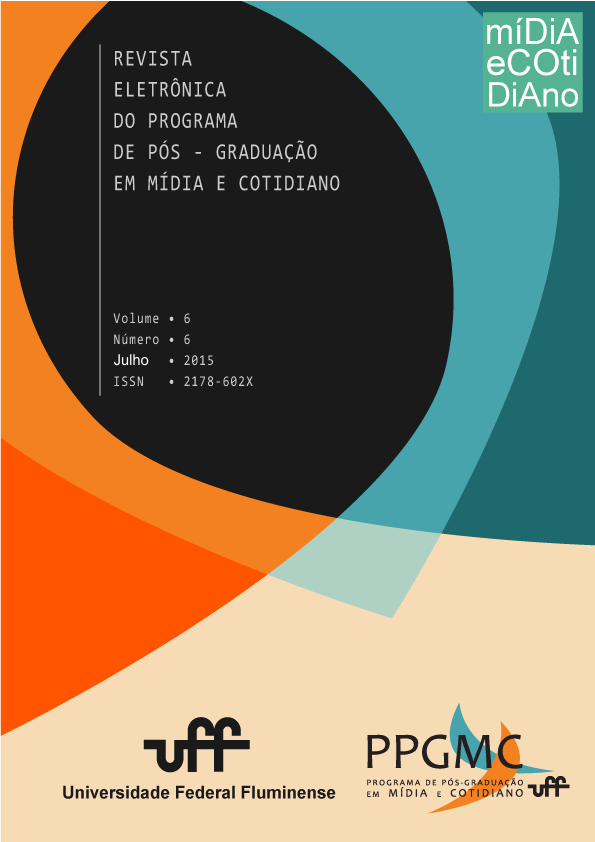IMEDIAPOLIS: CIDADE, TECNOLOGIA E POLÍTICA
DOI :
https://doi.org/10.22409/ppgmc.v6i6.9737Résumé
Na Parte I o artigo busca as diferentes definições que têm sido associadas ao termo mediapolis, procurando relacioná-las aos conceitos de cidade, tecnologia e política. A pesquisa registrou o uso do termo mediapolis no contexto teórico da arquitetura, das comunicações, da sociologia e da política, bem como no da filosofia. Na Parte II o artigo apresenta os agentes sociáveis artificiais, mídias autônomas, inteligentes e capazes de interação/cooperação com seres humanos. Esses novos atores sociais subvertem os conceitos de cidade e de cidadão, sugerindo a evolução da Mediapolis para iMediapolis – intelligent media polis (cidade de mídias inteligentes). Conclui-se com a necessidade de rever as contribuições de Silverstone e demais autores sob a luz dos atores sociais artificiais.
Téléchargements
Références
Breazeal, Cynthia; Scassellati, Brian (1999) How to Build Robots that Make Friends and Influence People. In: IROS99. Kyonjiu, Korea.
Business Times. (2009) Creative Buzz at Mediapolis. March. Acesso em 10 de Julho de 2014: https://1north.wordpress.com/2009/04/06/creative-buzz-at-mediapolis/
Burd, Gene. (1982) Urban Uses and Social Impact of New Communication Technology: a critical and philisophical perspective. Qualitative Studies Division, University of Texas, July.
Christofidou, Eirini. (2012) Mediapolis – The convergence of the physical and digital spaces in the urban realm and locative media technologies, Master Dissertation, University of Sheffield.
Cogo, Denise; ElHajji, Mohammed; Huertas, Amparo (eds.) (2012) Diaspora, migration, communication technologies and transnational identities. Bellaterra, Institut de la Comunicació, Universitat Autònoma de Barcelona.
Coutinho, C.P.; Junior, J.B.B. (2007) Blog e Wiki: os futuros professores e as ferramentas da Web 2.0. In: SIIE.
Dalghren, Peter. (2013) Cosmopolitanism and Global Citizenship: the Rhetoric of Moral Agency. University of Copenhagen, Jan. 15-18.
Darling, Kate. (2012) Extending Legal Rights to Social Robots. In: We Robot Conference, April, University of Miami, Miami, USA.
Design Incubation Centre (2008) Robots 2.0 Workshop. Disponível: http://www.designincubationcentre.com/index/past-workshops/robots-20/index.html
Fogg, Brian J. (1998) Persuasive Computers: Perspectives and research directions. In: Proceedings of the CH198. Conference of the ACM/SIGCHI. New York: ACM Press.
Guerini, Marco et alli (2003) Persuasion Models for Intelligent Interfaces. In: Proceedings of the IJCAI Workshop on Computational Models of Natural Argument. Acapulco, Mexico.
Imbres, Peter (2007) Web 3.0: Attack of the Conversation Robots. Disponível: http://point-oh.com/?p=119
Inkinen, Sam. (2004) On the Electronic Zeitgeist. Aspects of the Information Society, Homo Symbolicus and the Global Village. European Institute for a Sustainable Information Society (EISIS), Helsinki, Finland.
Jong, Alex de; Schuilenburg, Marc. (2006) Mediapolis – popular culture and the city. Rotterdam: 010 Publishers, 2006.
Lipson, Hod (2007) Evolutionary Robotics: Emergence of Communication. In: Current Biology. Vol. 17, No 9.
Mehler, Alexandre et alii (2008) Handbook of Technical Communication. Berlin/New York, Mouton de Gruyter. Disponível: http://valian.kgf.uni-frankfurt.de/hal8/hal8.pdf
Nardi, Dario (2002) Intelligence as Communication-Roles and Needs of Socially Embedded Agents. In: Proceedings of the Lake Arrowhead Conference on Computational Social Science and Social Complexity.
Reddy, T. R.; Paul, S.; Jyothi, B. V. (2013) The Rise of The Cyborgian Epoch. In: International Journal of Computer and Information Technology, 2(2).
Rodgers, Scott; Barnett, Clive; Cochrane, Allan. (2008) Mediapolis – an introduction. In: Mediapolis - media practices and the political spaces of cities. Interdisciplinary workshop. The Open University, Milton Keynes, UK, 9-10 June, pp. 3-10.
Seligmann, Ari. (2013a) Artpolis Legacies Proliferation of Public Architecture Programs for Urban Regeneration in Turn of the Century Japan. In: Brown, Alexandra; Leach, Andrew (ed.). 30th Annual Conference of the Society of Architectural Historians, Australia and New Zealand. Gold Coast, Queensland, Australia, July 2-5, pp. 83-95.
Seligmann, Ari. (2013b) Revitalizing Cities: Architecture as Regional Catalyst from Bubble Era Blowouts to Fukushima Fallouts and Beyond. Japanese Studies Association of Australia, Conference, Japan Institute, ANU College of Asia & the Pacific, The Australian National University, Canberra, Australia.
Silva, Crystian K.P. (2007) Web 2.0: a migração para a Web Social. Ciência da Computação, UFJF.
Silverstone, Roger. (2006) Media and Morality: On the Rise of the Mediapolis. London School of Economics and Political Science, London, UK.
Spivack, Nova (2006) The Third-Generation Web is Coming. Conceito disponível: http://www.kurzweilai.net/meme/frame.html?main=/articles/art0689.html
Tufte, Thomas. (2011) Mediapolis, Human (In)Security and Citizenship. Communication and Glocal Development Challenges in the Digital Era. In: Christensen, Miyase; Jansson, Andre; Christensen, Christian (ed.). Online Territories: Globalization, Mediated Practice and Social Space. New York: Peter Lang, pp. 113-131.
Waal, Martijn de; Lange, Michiel de. (2010) The Mobile City: a conference on locative media, urban culture and identity. Netherlands Architecture Institute, Rotterdam, February 27¬-28.
Zhao, Shanyang (2006) Humanoid Social Robots as a Medium of Communication. In: New Media & Society, Vol. 8, No. 3, SAGE.
Téléchargements
Publiée
Numéro
Rubrique
Licence
Aviso de Direito Autoral Creative Commons
1. Política para Periódicos de Acesso Livre
Autores que publicam nesta revista concordam com os seguintes termos:- Autores mantém os direitos autorais e concedem à revista o direito de primeira publicação, com o trabalho simultaneamente licenciado sob a Licença Creative Commons Attribution que permite o compartilhamento do trabalho com reconhecimento da autoria e publicação inicial nesta revista.
- Autores têm autorização para assumir contratos adicionais separadamente, para distribuição não-exclusiva da versão do trabalho publicada nesta revista (ex.: publicar em repositório institucional ou como capítulo de livro), com reconhecimento de autoria e publicação inicial nesta revista.
- Autores têm permissão e são estimulados a publicar e distribuir seu trabalho online (ex.: em repositórios institucionais ou na sua página pessoal) a qualquer ponto antes ou durante o processo editorial, já que isso pode gerar alterações produtivas, bem como aumentar o impacto e a citação do trabalho publicado (Veja O Efeito do Acesso Livre).


